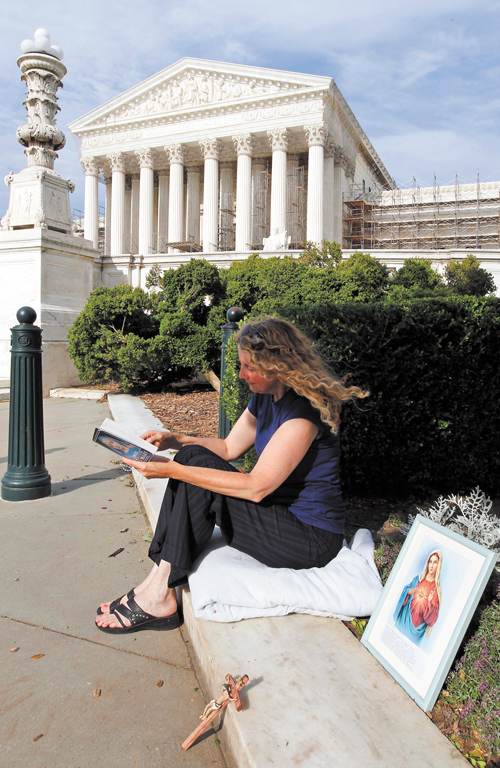A supremely important day for all sides on health care


Carol Anderson of Williamsburg, Va., reads as she is the first person in line to attend today’s reading of the decision at the U.S. Supreme Court on the constitutionality of the Affordable Care Act. She started the line Wednesday afternoon.
McClatchy Newspapers
KANSAS CITY, Mo.
Busy day today?
If you’re a doctor, nurse, patient, lawyer, politician, employer, employee, student, homemaker, hospital administrator, insurer or anyone who’s ever been sick, or ever will be, the likely answer is yes.
You’ll be scanning the Web or flipping TV channels, waiting for nine Supreme Court justices to announce their views on the nation’s health- care reform law.
We’ll likely know what the judges have decided in the hour after 10 a.m. The roar from the reaction will last just a bit longer. Decades, probably.
“This is potentially the most significant Supreme Court decision in 80 years,” said Jim Heeter, president and CEO of the Greater Kansas City Chamber of Commerce and a lawyer. “I’ll be watching. I think most of the country is going to be watching.”
Other legal experts go further, suggesting the court’s ruling on the law could be the most important it has ever issued.
“The level of interest in this case is unprecedented,” said Douglas Linder, a constitutional law professor at the University of Missouri-Kansas City. “They’re betting on it on InTrade.”
The frenzy surrounding today’s anticipated health-care ruling has been building for weeks.
“What-if” stories have popped up on blogs and newsgathering websites, as experts war-game the fallout from the ruling, whatever it turns out to be.
Cable and network news divisions will break in to programming once the decision is made public Thursday morning. SCOTUSBlog, which plans to post the decision as soon as it’s released, expects 250,000 visitors, by far the most it has ever had.
The blog recently upgraded its servers to handle the expected traffic.
Politicians and candidates are ready, too. Statements will spring from the White House to K Street to Capitol Hill.
Indiana U.S. Senate candidate Richard Mourdock, a Republican, recently taped reactions to several possible rulings — each of which accidentally migrated to YouTube.
“It’s a telegraphed, major media event,” said Mark Nevins, a political consultant who worked with Kansas City Mayor Sly James and is now advising Missouri congressional candidate Teresa Hensley. “You can see a major media story coming from a mile away, and that doesn’t happen very often in campaigns.”
It’s possible that all the preparation and anticipation will be wasted.
There’s a small chance the court could ask for a rehearing, which would delay a final opinion. It could also rule the case can’t be decided until the law is more fully in effect in 2014, or it could decide to release its opinion Friday, or whenever it wants.
Few expect a delay, though. For better or worse, Thursday’s the day.
For all the preparation, the ruling may take some time to decipher. That’s because the nine justices are facing four questions, not just one:
— Is the case being considered too soon?
— Does the law unconstitutionally coerce states into expanding Medicaid, health insurance for the poor?
— Is the requirement that almost everyone buy insurance constitutional?
— If it isn’t, must the entire law be removed, or can parts of it remain in effect?
The judges could issue one global ruling, or answer each question separately.
And their votes can be split: One or more justices could join an opinion in part but oppose it in another. A judge might decide the individual mandate is constitutional, but that it can’t be severed from the rest of the law. So the whole law might fall if a majority of other justices think the mandate is unconstitutional.
On Monday, for example, eight judges on the court issued a split decision on Arizona’s immigration law, discarding some parts but upholding a section. Some early headlines called the ruling a victory for opponents of the law, while later stories suggested supporters had prevailed.
That debate isn’t over. A similar dispute is possible Thursday.
“Supreme Court decisions are issued in a predictable format,” veteran court reporter Lyle Denniston wrote on SCOTUSBlog Wednesday. “What they say, though, is far from predictable.”
While America prepares to react to whatever the justices decide, new evidence of the nation’s split verdict on the law itself surfaced again Wednesday.
An NBC-Wall Street Journal poll showed 37 percent of those surveyed would be happy if the court discards the law, while 22 percent would be disappointed. But the largest plurality — nearly 40 percent — would have “mixed feelings” if the law is struck down.
That finding mirrors other polls, which generally show more Americans oppose the law than support it, but that there is no absolute majority for or against the Affordable Care Act.
At midafternoon Wednesday, InTrade participants put the chance that the court would throw out the mandate at 75 percent.
Experts say most Americans should not be worried that their health insurance will change overnight, no matter what the court rules. While the decision will eventually touch almost all Americans, it may take months — and a presidential election — before the country fully understands its health care options.
 43
43
